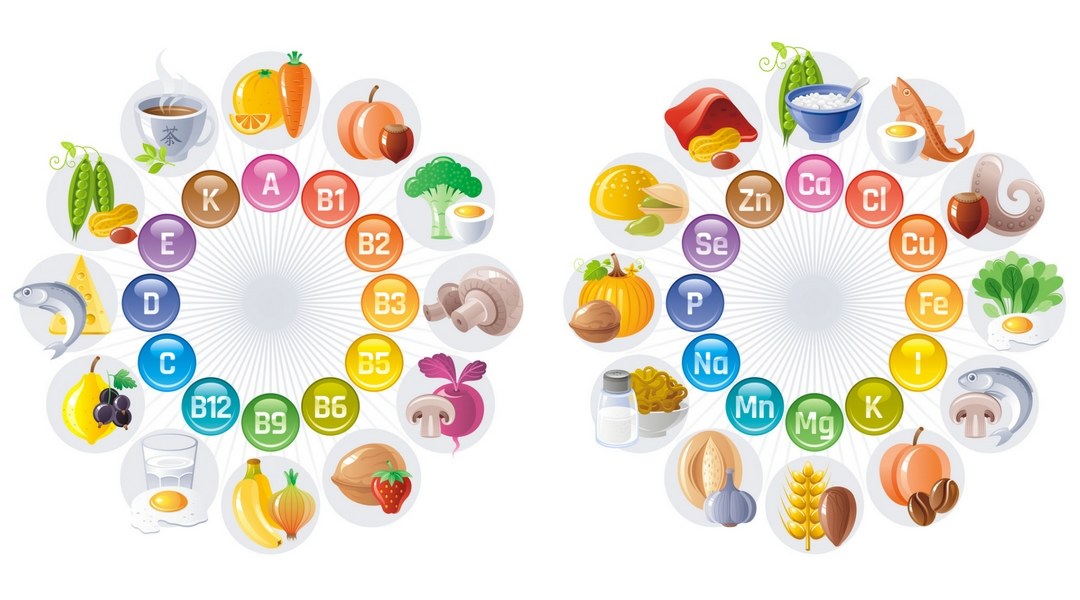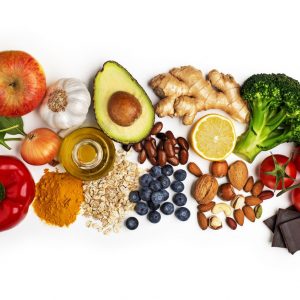Vitamins and minerals are synergistic in maintaining our body’s function, along with the Protein, Fats, Simple carbohydrates and Complex carbohydrates. With the correct balance of all of these, we are well supported, a deficiency in any of them will be detrimental to our health.
As with the 13 essential vitamins, there are essential minerals, there are said to be 16 these are:
Calcium, Chloride, Chromium, Copper, Floride, Iodine, Iron, Magnesium, Manganese, Molybdenum, Phosphorus, Potassium, Selenium, Sodium, Sulfur and Zinc.
Minerals are essential in maintaining blood pressure, hydration & electrolyte balance, as well as bone health; making new cells; delivering oxygen to cells; and contributing to normal muscle and nerve functioning. Minerals are obtained from foods, with specific minerals being found only in certain foods. By eating a variety of nutrient-dense foods from the 5 food groups, you will have a mineral-rich diet.
Two minerals of particular importance are calcium and iron. Unfortunately, in so many of our diets, we do not enough iron or calcium. Calcium is required for the foundation of strong bones and teeth. Calcium levels throughout life are essential for the maintenance of bone density to prevent osteoporosis (where bones lose Calcium their matrix becomes compromised and this can lead to bones that can fracture easily). Calcium is found mostly in the milk group – milk, cheese, and yoghurt. Some food manufacturers add Calcium in their production process; therefore, calcium-fortified juices and cereals also provide ample amounts of calcium. Smaller amounts of calcium can be found in tofu, greens, and legumes.
Minerals deficiency
The world moves at a rushed pace nowadays. In the event that you have a feeling that you’re continually running on the edge, you’re not the only one. Many people say that they simply don’t have the energy they need to function. Once in a while, the reason for tiredness is self-evident — for instance, getting over a cold or other illness, or not getting enough rest. Vitamin deficiency may be the root cause. It may be best to request your doctorto check a couple of vitamin levels, for example, the three we’ve recorded below.
Iron
Low levels of red platelets in our haemoglobin which can be due to an Iron deficiency reduces our ability to transport oxygen around the body. This can cause severe tiredness and can be a high indication of an illness. A blood test to confirm the red platelet level and thus a measure of the quality haemoglobin and myoglobin in the cells can be a good indicator.
The best way to maintain your Iron levels is with a diet rich in natural iron sources like red meat, eggs, rice, and beans. Failing that an iron supplement may be an answer. The rider to this is to make sure that it doesn’t affect any medication you may be taking, high Iron levels can also be severely detrimental. So iron helps to carry oxygen from the lungs to working cells throughout the body. Iron deficiency, the most common nutrient deficiency worldwide, results in fatigue, weakness, pallor (pale skin, lips, tongue, palms and mouth), and anemia.
Iron is found mainly in meat, poultry, fish, eggs, legumes, greens, and dried fruits. Bread and cereals are enriched with iron during the manufacturing process; therefore, enriched bread and cereals also are good sources of iron. If you eat a vitamin C source and an iron source at the same meal, you can double the amount of iron absorbed.
Vitamin B12
Your body needs adequate vitamin B12 so as to deliver healthy red platelets. So low levels of B12 can likewise cause fatigue. The principal sources of B12 are meat and dairy items, for most people they can get enough through diet alone. In any case, it gets more difficult for the body to ingest B12 as you get older, and a few sicknesses (for instance, digestive tract problems) can likewise impede absorption or retention. Numerous veggie lovers and vegetarians become insufficient in B12 on the grounds that they don’t eat meat or dairy. When B12 insufficiency is diet-related, supplements may be required along with dietary changes to expand B12 consumption for the most part work. Medical reasons for B12 insufficiency are typically treated with oral or intravenous infusions of vitamin B12.
Vitamin D
A shortfall of this vitamin can reduce mineral absorption resulting in bone and muscle quality. This vitamin is one of a kind in that your body can create it when your skin is exposed to daylight, yet there additionally aren’t numerous regular food sources of it. You can discover it in certain kinds of fish, (for example, fish like salmon) and in added vitamin and mineral items, for example, milk, squeezed orange, and breakfast oats. Supplements are another approach to guarantee you’re getting enough vitamin D (note that the D3 structure is simpler to assimilate than different types of vitamin D).
Calcium Deficiency
Calcium is fundamental for each cell in your body. It mineralizes bones and teeth, particularly during times of fast development. It is additionally significant for bone upkeep. Moreover, calcium fills in as a flagging particle. Without it, your heart, muscles, and nerves would not be able to work. The calcium fixation in your blood is firmly directed, and any abundance is put away in bones. On the off chance that your level is deficient, your bones will give up its calcium to support the vital functions. That is the reason the most widely recognized indication of calcium deficiency is osteoporosis, seen by slow and increasingly delicate bones. Despite the fact that foods are enriched, the amount is marginal, a great many people are still not getting enough calcium.



